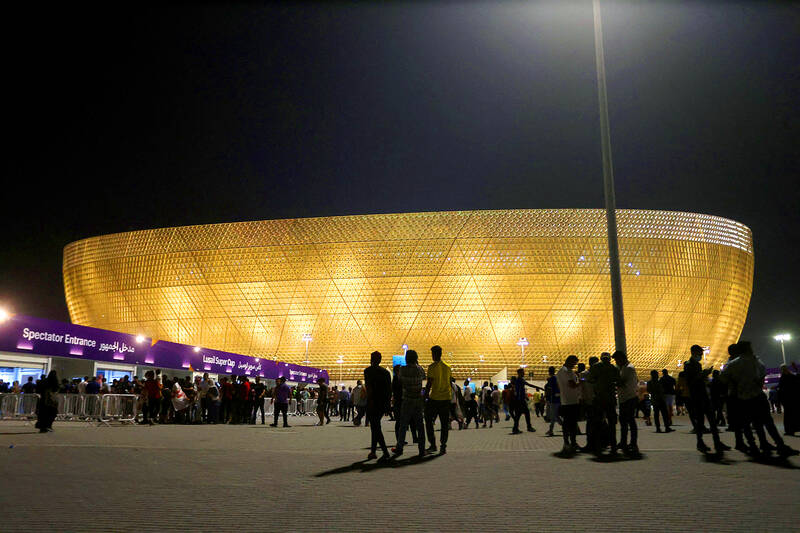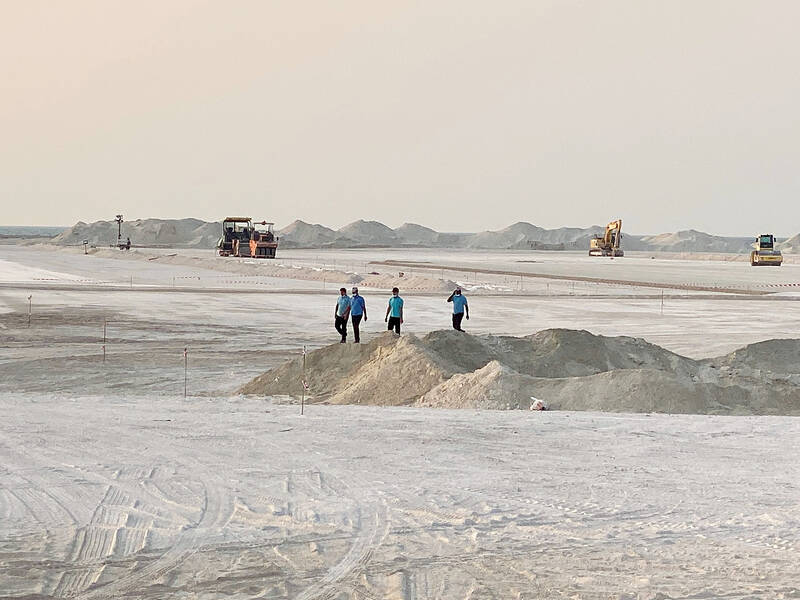“Stop. Can’t you see the metro station is full? Stop,” a frazzled supervisor shouted as green-vested marshals linked arms to contain thousands of fans streaming from the stadium that is to host soccer’s World Cup final in Qatar.
It was after midnight on Friday and, for hours, nearly 78,000 people had been filing out of the stadium after a near-capacity match tested the small Gulf state’s readiness for the tournament, which starts on Nov. 20.
“Let us through. We have children,” cried one man carrying a sweaty toddler.

Photo: Reuters
“We need water. Is there water?” a woman shouted from behind the line.
There was none.
Stadium stands were out of water by halftime and there was none outside, where the late summer temperature was 34°C, but felt far hotter because of the humidity.

Photo: Reuters
Friday’s match, called the Lusail Super Cup, was the first time the new Lusail stadium has hosted such a crowd. At 80,000 seats, it is the largest of Qatar’s eight World Cup stadiums and a gold-clad showpiece designed to host the final match on Dec. 18.
Qatar is the first Middle Eastern country and smallest nation ever to host the World Cup. While it has spent billions of dollars on infrastructure, it has never organized an event on such a scale — which unusually for a World Cup would also be held in or around a single city.
There are to be four matches around Doha every day for the first 12 days of the tournament. World soccer governing body FIFA says that 2.45 million tickets out of a possible 3 million are already sold and an unprecedented 1.2 million people, equivalent to nearly half Qatar’s population, are expected to visit.
Organizers said that exactly 77,575 people passed through the turnstiles on Friday, the largest crowd ever in Qatar. Families brought young children to the stadium, arriving ahead of a performance by Egyptian singer Amr Diab. Hundreds of Saudi Arabian fans wore the blue jersey of al-Hilal, the Saudi Arabian team who beat Egypt’s Zamalek on penalties after a 1-1 draw.
With migrants often bused in to fill empty arenas, hundreds of South Asian and African workers were also there together in a section of the stadium, wearing identical white, blue or red T-shirts. They left en masse at halftime to board buses away.
Asked about the teething problems, a spokesperson for organizers, the Supreme Committee for Delivery and Legacy, said the game was designed to identify operational issues and learn lessons for a “seamless” World Cup.
“Every team involved in the event’s organization gained invaluable experience they will carry into this year’s tournament,” the spokesperson added in a statement.
In the post-game chaos, one fan leaving the stadium swore, elbowed a marshal in the neck and broke through the cordon, followed by several others, trying to reach the metro.
The station entrance is 400m from the stadium, but fans waited in a 2.5km line snaking back and forth across an empty lot. Officials said that was to prevent a stampede.
“This is such a mess,” said Eslam, an Egyptian fan who has lived in Doha since 2004 and had his arm around a bleary-eyed and exhausted friend in the line. “I don’t want to go to the World Cup any more. Not if it’s like this.”
Some suppliers, caterers, security personnel and medical staff had difficulty accessing the stadium, a supplier said.
“Even some ambulances were driving around trying to figure out where they were supposed to be positioned. We were given the wrong directions over-and-over and the parking passes we had were for lots that didn’t exist,” said the supplier, who did not want their name published due to the sensitivity of the situation.
The stadium cooling system, which Qatar has described as state-of-the art, struggled to keep the stands cool. Humidity levels and temperatures are to be lower when the tournament starts, but there would be other challenges.
Unlike on Friday, ticket holders would be able to drink beer outside stadiums before and after each game.
Friday’s game was also a test for stadium security. Close to the pitch, guards in dark clothes and baseball caps were positioned every few meters in the aisles, monitoring fans, who were enthusiastic, but well-behaved.
Outside, guards patrolled the perimeter in groups of five men or five women, each with a hook-shaped baton dangling from their belt. Some carried fistfuls of zip-tie handcuffs.
Preparations go far beyond the stadiums.
To prevent traffic across its only land border — with Saudi Arabia — from jamming roads, organizers are levelling a section of desert where fans are to park their vehicles and board buses for the 100km journey up the desert highway to Doha.
Authorities would limit vehicles on the roads by ordering schools to close for the tournament, banning vehicles from swathes of the city and urging businesses to have staff work from home.
An old airport is back in operation to handle extra flights and new passport control stands are being introduced to triple the number of passengers Qatar can process. Qatar Airways is shifting 70 percent of its flight schedule to create more landing slots during the tournament.

Freddie Freeman homered and drove in four runs, Shohei Ohtani also went deep and Roki Sasaki earned his first major league win as the Los Angeles Dodgers beat the Atlanta Braves 10-3 on Saturday night for their seventh straight victory. The Dodgers have won the first two games of the series to improve to 5-0 against Atlanta this year. Los Angeles’ three-game sweep at home early in the season left the Braves 0-7. Sasaki allowed three runs and six hits over five innings. The 23-year-old right-hander gave up a home run to Ozzie Albies, but received plenty of offensive support in his

Bayern Munich on Sunday were crowned German champions for the 34th time, giving striker Harry Kane his first major trophy, after second-placed Bayer 04 Leverkusen drew 2-2 at SC Freiburg. Bayern’s 3-3 draw at RB Leipzig on Saturday, when the Bavarians came from two goals down to take the lead before conceding a stoppage-time equalizer, meant defending Bundesliga champions Leverkusen needed to win at Freiburg to delay the title party. Leverkusen were two goals down before scoring twice in the final 10 minutes, but Xabi Alonso’s side could not find a third, as Bayern reclaimed the title at the first attempt after

A man fell from the 6.4m-high Clemente Wall in right field at PNC Park in Pittsburgh during Wednesday night’s game between the Pirates and the Chicago Cubs. Right after Andrew McCutchen hit a two-run double in the seventh inning to put the Pirates ahead 4-3, players began waving frantically for medical personnel and pointing to the man, who had fallen onto the warning track. The fan was tended to for approximately five minutes by members of both the Pirates and Cubs training staffs as well as PNC personnel before being removed from the field on a cart. The team issued a statement shortly

PAINFUL VICTORY: Ruud said that felt pain in his rib during the warmup and was put on painkillers so that he could finish the match against Argentine Francisco Cerundolo With the help of painkillers, Casper Ruud overcame a rib ailment to defeat Francisco Cerundolo in straight sets and reach the Madrid Open final on Friday. Ruud is to face Jack Draper, who beat Lorenzo Musetti 6-3, 7-6 (4) in the other semi-final to make his third final of the year. Ruud received treatment on his rib three games into the match and went on to win 6-4, 7-5 on the Caja Magica center court. The 15th-ranked Norwegian saved 15 of the 18 break points he faced against the 21st-ranked Argentine. Ruud said he felt something in his rib during the warmup, just before